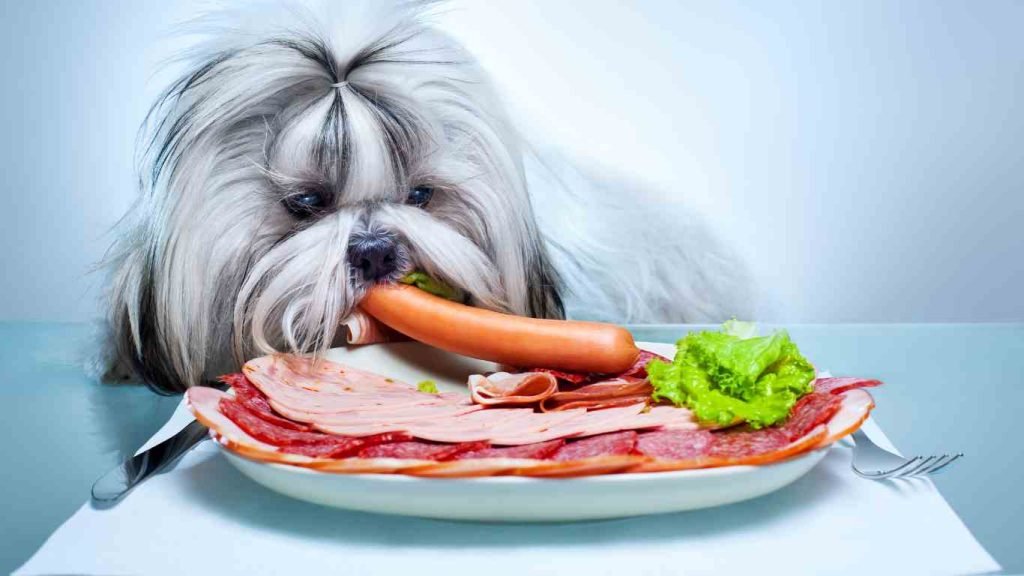Imagine settling down for a hearty breakfast, your plate piled high with glistening breakfast sausage—only to lock eyes with your canine friend, silently pleading for a taste. It’s a common scene, isn’t it? But here’s something unexpected: a single breakfast sausage can contain up to 50 percent of a dog’s recommended daily fat intake. Indulging their meaty cravings may seem harmless, but as your four-legged companion gazes longingly at your plate, you might wonder, “can dogs eat breakfast sausage,” and if so, “is breakfast sausage safe for dogs?”
The reality is that, while these flavorful meats do catch their attention, introducing breakfast sausage into a canine diet should be approached with caution. Not only do they lack substantive nutritional value, breakfast sausages can even pose a health risk due to high fat content, sodium levels, and certain seasonings that are harmful to pups. When considering your dog’s diet, lean towards healthier, dog-specific treats that follow nutritional guidelines to keep them tail-wagging and healthy.
Can Dogs Eat Breakfast Sausage Core Insights:
Understanding Canine Nutrition and Breakfast Sausage
As a dog owner, understanding what feeds into a healthy canine diet is essential. Dogs, indeed, have a natural requirement for proteins as part of a balanced nutrition plan, but not all protein sources are created equal, especially when considering the nutritional value of breakfast sausage for dogs.
Protein Needs in a Dog’s Diet
Proteins are building blocks for a dog’s body, contributing to healthy muscles, tissues, and immune function. Ideal best breakfast options for dogs should contain high-quality protein that is easily digestible and caters to their omnivorous diet. But when it comes to breakfast sausage, the scenario is quite different.
The Reality of Processed Meats
Processed meats, like breakfast sausage, come with a high-fat profile and an excessive amount of sodium. For your pup, this can lead to unnecessary health complications that contradict the requirements of a canine diet. Instead, whole meats such as cooked chicken or turkey can deliver the protein content they need without the harmful additives found in processed options.
Milk-Bone MaroSnacks Dog Treats, Beef, 40 Ounce
Nutritional Value of Breakfast Sausage for Dogs
When considering feeding your furry friend breakfast sausage, it’s important to dive into what it truly offers nutritionally. The packaging may boast protein, but the reality is often an assortment of less-desirable ingredients and nutritional values.
| Component | Whole Chicken/Turkey | Breakfast Sausage |
|---|---|---|
| Actual Meat Content | 100% | Less than 50% |
| Protein Quality | High | Moderate to Low |
| Fat Content | Low to Moderate | High |
| Sodium Content | Minimal | Excessive |
| Additives | None | Varied (preservatives, flavor enhancers, etc.) |
Your dog’s health is paramount, and though they may be drawn to the savory smell of breakfast sausage, considering the nutritional value and offering healthier alternatives aligns better with their dietary needs. Choose wholesome, unprocessed meats and ensure that your dog remains energetic, healthy, and ready to enjoy every new day with you.

Why Breakfast Sausage May Be Harmful to Your Dog
Many dog owners wonder about the health risks of feeding dogs breakfast sausage and whether is breakfast sausage safe for dogs. It’s important to understand why this common breakfast food may not be the best choice for your canine companion’s health.
The Dangers of High Fat Content
The high fat content in breakfast sausage can be particularly dangerous for dogs. A typical sausage may contain about 50% fat, which is a key factor in leading to obesity, a common health issue for pets. Over time, a high-fat diet can contribute to more serious conditions such as heart disease and pancreatitis, a painful and potentially life-threatening inflammation of the pancreas.
Nulo Freestyle Bone Broth, Premium Food Topper for Dogs
The Risks of Sodium and Spices
Dogs’ dietary needs do not include high levels of sodium, yet breakfast sausage often contains excessive amounts. Consuming too much sodium can harm your dog’s kidneys and lead to heart problems. Moreover, spices that are found in sausages—such as onion and garlic—may seem harmless but can actually be toxic to dogs. These ingredients can cause gastrointestinal upset and in severe cases, lead to hemolytic anemia by damaging your dog’s red blood cells.
In light of these concerns, it is clear that choosing safer and healthier alternatives for your dog is the wiser option to maintain their well-being. Here’s to the health and happiness of your four-legged friend!
Recognizing Toxic Ingredients in Breakfast Sausage
When treating your furry companion to a flavorful meal, it’s vital to be aware of the toxic ingredients in breakfast sausage for dogs. Despite its savory appeal, breakfast sausage can contain elements that are detrimental to your canine’s health. Understanding these dangers will help ensure that you are selecting the safest alternatives to breakfast sausage for dogs.

Onion and Garlic: Hidden Hazards
You might be surprised to learn that ordinary kitchen staples like onions and garlic, often found in breakfast sausage, pose hidden hazards to dogs. In even minuscule amounts, these substances can create gastrointestinal issues and may culminate in hemolytic anemia by destroying red blood cells. Being aware of these risks is essential to protect the well-being of your pet.
Nutmeg and Other Harmful Spices for Dogs
Nutmeg, secreted within the spice blend of many breakfast sausages, has its own deleterious effects. While a single, small dose may not immediately signal danger, repeated ingestion can build up to toxic levels over time. Steering clear of nutmeg and other harmful spices becomes a priority in keeping your companion safe from harm.
Soft Dog Blanket Washable, Dog Calming Blankets
$13.99 in stock
To help you distinguish between safe and unsafe ingredients, here’s a detailed table spotlighting common hazardous components found in breakfast sausages:
| Toxic Ingredient | Possible Effects on Dogs | Quantity Risk Level |
|---|---|---|
| Onions | Gastrointestinal distress, hemolytic anemia. | Low to High (Small amounts can be dangerous) |
| Garlic | Upset stomach, red blood cell damage. | Low to Moderate (Varies by dog’s size and health) |
| Nutmeg | Toxicity leading to disorientation, increased heart rate. | Moderate to High (Especially with frequent consumption) |
| Salt | Kidney damage, increased blood pressure. | Moderate to High (Excess amounts are harmful) |
Looking after your dog’s diet is more than just avoiding specific harmful ingredients; it’s about creating a balanced approach that can be sustained long-term. Opt for genuine meat treats or veterinarian-recommended commercial dog treats that recognize canine dietary needs. These alternatives not only keep your dog from potential toxins but also offer nutritional benefits that enhance their overall health.

Is Breakfast Sausage Safe for Dogs?
As a responsible pet owner, you’re likely on the alert for safe dietary choices for your furry friend. The question of “can dogs eat breakfast sausage” can be a contentious one. While an occasional small morsel may seem harmless, understanding the implications on your dog’s health is paramount. Breakfast sausage is typically laden with elements that might compromise canine wellbeing.
Consider the high-fat content found in most types of breakfast sausage. While dogs need some fats in their diet, the excessive amount in sausages can lead to weight gain and serious conditions like pancreatitis. Furthermore, the sodium levels in breakfast sausages far exceed the dietary needs of your four-legged companion, increasing the risk of kidney and heart issues.
Toxic spices, which can sometimes sneak into the sausage composition, stand as another red flag. Not only do spices like onion and garlic cause gastrointestinal upset, but they can also lead to more severe health problems such as hemolytic anemia. So, when pondering, “is breakfast sausage safe for dogs,” these risks certainly tip the scale towards caution.
Given the health hazards associated with this human breakfast staple, exploring alternatives to breakfast sausage for dogs is advisable. Nutritious, dog-specific treats not only satisfy your pet’s cravings but also contribute to their overall health and vitality without the added risks.
The answer then, to the safety of breakfast sausage in a dog’s diet, does not bend towards indulgence. Regular or significant quantities of this treat could inflict more harm than the satisfaction it brings. A clear reflection on the possible repercussions of including breakfast sausage in your dog’s diet is essential. This will ensure their happiness and health remain at the forefront of your dietary decisions for them.

Sausage Alternatives: Healthier Treat Options for Dogs
Realizing that your furry friend deserves the best breakfast options for dogs, you might be seeking alternatives to breakfast sausage. Healthier options not only provide the nutrition they need but also ensure long-term well-being, without the dangers posed by traditional breakfast sausages.
Whole Meat Treats
When considering breakfast sausage treats for dogs, it’s always a good choice to go with whole meat treats. These include unseasoned chicken, turkey, or premium cuts of beef. Unlike traditional breakfast sausage, which often contains an assortment of unhealthy added fats and salts, whole meats offer a rich source of protein and essential nutrients without the bad extras.
Ark Naturals Soft Shield Protection+ Brushless Toothpaste
Commercial Dog Treats and Their Standards
For convenient and ready-made options, the pet food industry offers a plethora of commercial dog treats that can be perfect alternatives to breakfast sausage for dogs. These products align with the nutritional standards set by the Association of American Feed Control Officials (AAFCO) and are often vet-recommended. When selecting these treats, look for labels that show compliance with AAFCO guidelines to ensure that your dog is receiving a treat that’s both safe and nutritious.
- Chicken strips
- Lean beef bites
- Dehydrated turkey pieces
By choosing healthier alternatives to traditional breakfast sausage, you’re not only catering to your dog’s taste but also contributing positively to their overall health and vitality. Opting for whole meats or AAFCO-compliant treats means peace of mind for you and a happier, healthier pooch.

Can Dogs Eat Breakfast Sausage in Moderation?
As a pet parent, you may sometimes wonder if can dogs eat breakfast sausage as part of their canine diet and breakfast sausage indulgences. While it’s generally not recommended to feed our furry friends processed and high-fat foods, there might be moments when sharing a little nibble seems harmless. But, before slipping your dog that delightful breakfast treat, it’s crucial to understand the impact it may have, and practice smart portion control.
Understanding Portion Control
When considering breakfast sausage treats for dogs, portion size is vital. Just a small piece of sausage can be replete with calories and saturated fats, putting your pup at risk of exceeding their daily nutritional needs. It’s essential to restrict breakfast sausage to a very minimal part of your dog’s diet, if at all. Here’s a look at what a medium-sized dog needs compared to what is found in an average piece of breakfast sausage:
| Nutrient | Dog’s Daily Requirement | Content in Average Breakfast Sausage |
|---|---|---|
| Calories | 25-30 per pound of body weight | Approx. 100 for one small link |
| Fat | Less than 30% of daily intake | 8g per link, mostly saturated |
| Sodium | 100 mg per 100 kcal | 200-400 mg per link |
The Occasional Sausage Treat: When Is It Okay?
The key with can dogs eat breakfast sausage is rarity and moderation. Think of sausage as you would a high-value treat, offered only for exceptional behavior or infrequently enough to avoid routine. A tiny bit of sausage without the skin, which might contain additional additives, could be acceptable for a generally healthy dog. However, always inquire with your vet before introducing new food items to your dog’s diet, especially those like breakfast sausages that step far from typical canine nutritional guidelines.
Remember, too frequent or large servings of breakfast sausage, or regularly medicaling canine diet with breakfast sausage treats for dogs, could lead to various health concerns, from minor stomach upsets to more severe long-term conditions stemming from inappropriate diet. Your best bet for maintaining your dog’s health and happiness is sticking to a balanced diet with occasional, carefully chosen treats.

Impact of Sausage Consumption on Specific Dog Health Conditions
Feeding your furry friend breakfast sausage may seem like a loving treat, but it is essential to understand the health risks of feeding dogs breakfast sausage, especially for those with existing health conditions. Finding the best breakfast options for dogs should be a priority to ensure their longevity and well-being.
Obesity and Pancreatitis Risks
Due to the high fat content of breakfast sausages, dogs can easily fall into the trap of obesity, which significantly increases their risk for developing pancreatitis. This inflammation of the pancreas is painful and can lead to other digestive issues. Let’s examine how breakfast sausage affects dogs predisposed to such conditions.
Milk-Bone Soft & Chewy Dog Treats, Chicken, 25 Ounce
Implications for Dogs with Heart, Liver, or Kidney Disease
For canines battling heart, liver, or kidney disease, consuming high-sodium foods like breakfast sausage can exacerbate their condition, tipping the scales to potentially dangerous levels. The table below illustrates healthier breakfast choices that cater to their dietary needs.
| Dog Health Condition | Preferred Nutrient Levels | Risky Ingredients in Breakfast Sausage | Healthier Breakfast Alternatives |
|---|---|---|---|
| Heart Disease | Low Sodium | High Sodium | Lean, Unseasoned Chicken |
| Liver Disease | Low Fat, Controlled Protein | High Fat, Unspecified Meat Sources | Quality Vet-Approved Commercial Diet |
| Kidney Disease | Low Phosphorus, Moderate Protein | Phosphates, Preservatives | Prescribed Kidney-Support Diets |
With these tailored dietary options, you can provide your dog not only with nurturing care but also with the joy of a delicious and nutritious breakfast, free from the perils of inappropriate food items like breakfast sausage.

Dogs Consuming Breakfast Sausage: Signs of Distress to Watch For
As a responsible pet owner, it’s important to be alert to the signs of dog distress, especially after they’ve indulged in foods outside their usual diet. Understanding the impact of dogs consuming breakfast sausage is critical, not just in terms of nutritional value, but also the potential health risks it poses. Below, you’ll find crucial information about the symptoms that should trigger your concern.
Symptoms of Gastrointestinal Upset
It’s not uncommon for dogs to experience gastrointestinal upset after eating something they shouldn’t have, such as breakfast sausage. Be on the lookout for the following symptoms:
- Vomiting: An immediate reaction where your dog may try to rid itself of the offending food.
- Diarrhea: Could occur within hours and is a sign that your dog’s system is struggling with the food’s contents.
- Loss of Appetite: Your dog may become disinterested in food due to feeling unwell, which is an immediate red flag.
If your beloved pet shows any of these symptoms, it’s wise to monitor them closely. Offering boiled chicken and rice can help settle their stomach, but if symptoms persist, a visit to the vet is necessary.
Pur Luv Chicken Jerky Dog Treats, Rawhide-Free, Made with Real Breast
$10.85 in stock
Recognizing the Signs of More Serious Conditions
In more grave scenarios, there are additional symptoms that can signal serious health conditions related to dogs consuming sausage:
- Nausea: Though more subtle, watch if your dog is licking their lips excessively or eating grass.
- Lethargy: A lack of energy or disinterest in play can be an indication of an underlying problem.
- Dehydration: Check if your dog’s skin lacks elasticity or if their gums are dry, indicating dehydration.
Trichinosis, due to contaminated meat, or acute pancreatitis are conditions that require immediate veterinary attention. These conditions are serious and can deteriorate quickly without proper intervention.
| Symptom | Potential Condition | Immediate Action |
|---|---|---|
| Vomiting | Gastrointestinal Distress | Monitor and provide bland diet |
| Diarrhea | Food Intolerance | Rehydrate and visit vet if persists |
| Lethargy | Trichinosis / Pancreatitis | Seek veterinary care |
Remember, preventive measures and prompt action can safeguard your dog’s health, keeping them happy and well-nourished with appropriate treats that add nutritional value without the risks.

Join Our GeoZoo Family
Subscribe to our Newsletter
Final Remarks
As we consider the dietary habits ideal for our furry friends, one question often arises: can dogs eat breakfast sausage? The answer revolves around acknowledging the potential health risks of feeding dogs breakfast sausage. While infrequent, small servings of breakfast sausage may not lead to immediate health problems, incorporating this food as a staple in your dog’s diet can pose serious concerns. High levels of fat and sodium, along with ingredients harmful to canines, are substantial reasons to steer clear.
Summary of Canine Dietary Safety with Breakfast Sausage
A fervent exploration into this subject reveals that canines have different nutritional needs, which breakfast sausage does not satisfy. The temporary indulgence your pet experiences when nibbling on such treats cannot justify the long-term detriments it might cause. Consuming breakfast sausage could contribute to unnecessary weight gain, sodium overdose, and even exposure to toxins, predicaments that responsible pet owners should avoid for the safety and longevity of their four-legged companions.
Encouraging a Balanced Diet Over Tempting Treats
What then, constitutes the best breakfast options for dogs? The focus should shift to a balanced diet, replete with whole, unprocessed proteins and treats that align with veterinary guidelines. Giving in to those pleading doggy eyes at breakfast time may seem harmless, but remember, your priority lies in nurturing their health and happiness. Instead of caving into temptation, offer dog-safe alternatives that contribute positively to their well-being. Your choice to avoid giving your pet breakfast sausage reflects a deep devotion to their health, an act of love that truly resonates in every aspect of care you provide for them.
FAQ
Can dogs eat breakfast sausage?
What are the protein needs in a dog’s diet?
What is the reality of processed meats for dogs?
What is the nutritional value of breakfast sausage for dogs?
Why may breakfast sausage be harmful to dogs?
What are the dangers of high fat content?
What are the risks of sodium and spices in sausage for dogs?
Are there any toxic ingredients in breakfast sausage that I should avoid feeding my dog?
What are healthier treat options I can give my dog instead of breakfast sausage?
Can dogs have a small piece of breakfast sausage occasionally?
What impact does sausage consumption have on dogs with specific health conditions?
What signs of distress should I watch for if my dog eats breakfast sausage?
Is breakfast sausage safe for dogs?
Meet Jake Harrington, your go-to guru for all things canine. With over 15 years of professional dog training experience, Jake has transformed the lives of thousands of dogs and their owners. His journey began in the bustling streets of a major city, where he discovered his natural affinity for understanding canine behaviors and communication.








